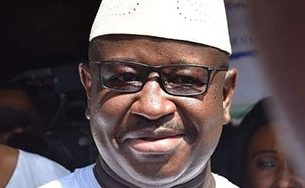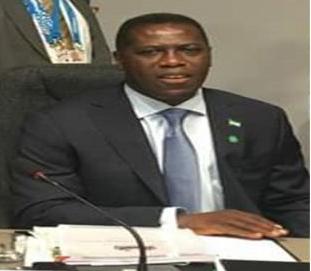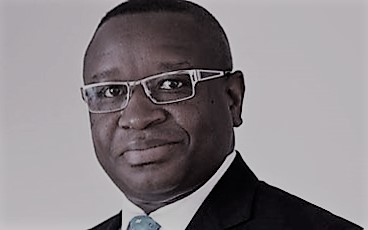Cross carpeting or political defections: How big a deal is it in Sierra Leone?
Anthony K Kamara (Snr) – Researches into Sierra Leone’s political history on the issue of cross carpeting/political defections from the 1950s to the present. (Photo: author)
The term “Cross Carpeting” was first heard in Sierra Leone after the first post Independence General Election of 1962 during the premiership of Sir Milton Margai. Looking back to Sierra Leone politics from the 1950s I discovered that cross carpeting is not new to Sierra Leone politics and in fact it pre-dates our Independence, going back to the late 1950s. It is not a crime either though seen as an act of betrayal in some quarters. There is nothing ideologically different in the manifestos of all political parties in Sierra Leone except the implementation. Everyone joins a party where his interest can be better served. People take a plunge into politics to make a difference, and therefore there is nothing like immorality.
So why should one continue to remain in a party that does not have one’s interest at heart or make a difference in one’s personal life? The answer to this question is what leads politicians to crossing the carpet. In most cases, cross carpeting is achieved through bribes, positions, offers of state resources, gifts, positions in government or even policy differences among party members especially the party leaders: all these are a lure to cross carpeting politicians. In this piece, I will attempt for the clear understanding of Sierra Leonean readership to breakdown into decades from the 1950s to the present.
But it should be made abundantly clear that there is a difference between cross carpeting and political defections. The two are synonymous but are no means the same. In both cases though they involve changing sides from section of the political spectrum to another. The question now is, who crosses the carpet and who defects?
To cross carpet, one must first be an elected member of Parliament and the act really takes place within the four walls of Parliament. The reasons or motivations for this act don’t really matter. The reasons are purely personal and people just have to accept that an act of changing sides has taken place. But the fact of the matter is that every human being wants to grow up and be seen as a grown up socially and affluence-wise. Nobody wants to remain socially stunted for his whole life time. MPs promises to their constituents of what they hope to achieve or accomplish during their time of office are too many. But those dreams cannot be accomplished when one is sitting in the opposition side. The 0pposition in all democracies are seen as obstructionists who will bring nothing to their people but excuses for their failure to perform. They are therefore seen as political sinners. The only way to make a difference to one’s people is by changing the sitting position in Parliament and joining ranks with those who do things to push forward the country’s development programme, for this is the only way forward. A Member of Parliament has to show his Report Card to his constituents as his term comes to an end and the people will evaluate his performance and determine if he deserves another term. A Report Card full of excuses is unacceptable. Cross carpeting therefore affords the MP the opportunity to make a difference socially, politically and of course developmentally. Excuses are not an option and therefore unacceptable.
Political defections on the other hand, take place outside the walls of Parliament and the actors are not elected members of Parliament. This act is for local politicians, not elected MPs or law-makers. There are in our society people of immense influence who can galvanise popular support in their communities. Having the support of such people of influence in a political party brings good dividends in the area of electoral advantage. The success of a party in a certain area depends to a great extent on their support. These are known as populist leaders who are many a time even more powerful than the men and women that elect. To win the support of such people brings rewards at election time. The governing party therefore always tries to weaken an opposition party by persuading such community leaders to DEFECT to the government side as it brings benefits to them.
Political defection or cross carpeting is older than our sovereignty. But true a governing party must at all times weaken the opponent. If a political leader wielding political power cannot show that he has power, then he may just as well pack up and quit the stage as unfit for leadership. This is what Sierra Leoneans learned from the politics of Sir Milton and his half brother Sir Albert Margai. The two Margais were experts in fishing out big fish from the net of the APC in the 1960s. It is a painful experience though and a political setback if one is in opposition, but it must be accepted as a “fait accompli”. Now let us take a look at cross carpeting from the 1950s to the present.
Cross carpeting in the 1950s:
After the formation of the SLPP in 1951, and its victory in the 1957 General Election, a number of political parties (all Creole) were formed in the colony including the National Council of Sierra leone (NCSL) led by HC Bankole Bright, the United Progressive Party (UPP) of Rogers-Wright, Dr Edward Blyden III’s Sierra Leone Independent Movement (SLIM). Dr. Blyden’s poor showing in the 1957 election in which both he and his three other party candidates of SLIM not only lost but forfeited their deposits, thus silencing him for the rest of his political life. The lesson for him was that being a political scientist is not the same as a politician. He thus resigned himself from politics for the rest of his life and instead focused on his teaching at Fourah Bay College. Dr HC Bankole Bright also suffered loss and shortly died broken-hearted and penniless. Sir Milton Margai had to generously give money to his family for a fitting funeral.
After the 1957 election, the UPP of Rogers-Wright became loser of his elected Members of Parliament when two elected members from the Protectorate Mahmoud Ahmed (Port Loko) crossed carpet to the SLPP and six months later became a Ministerial Secretary. Another, Valecius Neale-caulker also quit for the SLPP through inducements by SLPP Leaders. Then an illiterate but very influential businessman from Magburaka, Sanfa Adams and George Keister of Makeni, also quit the UPP for the SLPP. Earlier on in August 1956 the National Propaganda Secretary of the UPP M. A. Tarasid, resigned and joined the SLPP. Also in 1956,the UPP won over Mr. Peterr Kamara the most prominent of the Northern Strike Leaders of 1955, but by 1959 Peterr too was persuaded to join the SLPP.
Sanfa Adams was believed to have received a huge loan of 50.000 pounds to build a hotel in Magburaka a few weeks after declaring for the SLPP. The government loan to Sanfa Adams showed Sir Milton Margai’s willingness to use government largesse to win over opposition Members and thus weaken the opposition parties.
Shortly after these cross carpetings and defections, the Kroo tribal Headman in the UPP, announced he was quitting the UPP and joining the SLPP, because he was very much concerned about the welfare of Kroos in Freetown. “The UPP cannot do anything to help the Kroo, only the SLPP can”, he said.
Again, after the SLPP leadership contest between Sir Milton and his brother Albert, in which the younger brother won, but was prevailed upon to give up out of respect for the older Margai, Albert and his political ally Siaka Stevens quit the SLPP, defected to form his Peoples National Party (PNP) taking with him a number of articulate young men like Maigore Kallon, S T Navo the Chief Whip and Arthur J. Massally Deputy Speaker thus weakening the SLPP. In November 1959, I.T.A Wallace-Johnson and his Radical Democratic Party (RDP) joined the PNP. Tamba Briwa and A.A Mani (leaders of the Kono Progressive Movement (KPM), allied with the PNP to form the PNP-Alliance. But in 1960, on the eve of the London Constitutional talks for Independence, Albert Margai announced the dissolution of the PNP and his return to the SLPP. This could not have been done without some some serious political promise and inducement. He again took with him his regional brothers who had earlier on quit with Stevens. Stevens never returned, and instead he formed his own party drawn mainly from Northerners. To Stevens, this was the greatest political betrayal of his life. That was the first time he accepted the saying, ” fambul tik kin ben but nor dae broke”. Whatever behind the scenes negotiations took place, one thing was certain, and that was, some big promise to succeed was made anytime Sir Milton died, and it came to pass. One reality about the game of politics is the absence of political principles and therefore nothing immoral. All these cross carpetings and defections took place in the 1950s under the Sir Milton’s SLPP.
Cross carpeting in the 1960s:
The All People’s Congress was formed in 1960 after the formation of the United National Front Party put together by Sir Milton to travel to the United Kingdom for the final talks on the grant of Independence. After Sir Albert’s dissolution of the PNP and his return to the SLPP fold meant he had killed the only viable opposition to the SLPP. In protest, Siaka Stevens to form his own party drawn mainly from the North. So barely two years after its formation and one year after Independence, the first post Independence Election took place in 1962. In all four political parties contested the Election. The results of the 1962 Election were as follows: SLPP won 28 seats with 230,118 electoral votes in their favour (34.7%), the New APC won 16 seats with 114, 333 votes (17.2%), The Sierra Leone People’s Independent Movement (SLPIM) won 4 seats with 34, 839 votes in its favour (5.2%) and the United Progressive Party (UPP) of Rogers-Wright winning not a single seat with only 1,660 votes (0.3%). In addition, Independents won 14 seats with 282,724 (46.2%). Sir Milton’s SLPP had won the Election but without a comfortable majority in Parliament. This situation triggered the beginnings of inducements and all kinds of promises to some opposition APC members. Whatever promises were made for crossing carpet remained a secret to this day. But shortly after the Election, crossing carpet from the APC to the ruling SLPP began.
The member for Tonkolili North, M. K .Kabba Yallow (Now PC Mansa Kolio II), Prince Moses Koh from Bombali, and Max Saidu Kanu (Late PC Bai M’Kari N’Silk) of Mkari-Gbanti Chiefdom in Bombali were all fished out of the APC net, thus weakening the APC as an opposition. After Sir Milton’s death, Dr. John Karefa Smart quit the SLPP of which he was a founding Member, to join the APC.
In 1967, almost two weeks to election, Solomon A.J .Pratt, realising the imminent defeat of the SLPP, resigned from the SLPP to join the APC, and contested and won the Mountain Rural District which comprised of Fourah Bay College,the villages of Leicester, Regent, Gloucester etc. In the same year (1967), Luseni Alfred Morlu Brewah, from Taiama (Moyamba District), joined the APC after the election rather than support the SLPP under Sir Albert. More defections to the APC included Frank Ssnkoh Anthony, Prince Williams of Bo, and George Gobio Lamin.
Cross carpeting in the 1970s:
Defectors of this decade included Mohamed Omar Bash-Taqi and his brother Ibrahim Bash-Taqi, A.B Kamara (alias Bai Bai) from Port Loko District left the APC to join Dr. John Karefa Smart’s United Democratic Party (UDP). Augustine Josie Sandy, Francis Michek Minah left the SLPP and joined the APC (1978). Other defectors to the APC included Musa Pujeh, a businessman from Blama, Kenema District, Salia Jusu Sheriff, also from Kenema and Musa Tarawally. Some people argued that it was the imposition of the One Party State that ‘compelled’ these politicians to join the APC. But the fact of the One Party State simply meant that all those wishing to do politics had no alternative other than joining the APC because all other parties had officially been outlawed. There were other SLPP stalwarts like Yankay D. Sesay, a former Bo School Principal and first Resident Minister Northern Province in 1962. In the 1970s, he joined the APC and was appointed High Commissioner to Accra, Ghana. Dr. Sama Banya one of those on whose shoulders the SLPP rested, also quit his SLPP party and joined the APC and was made Minister in the 70s. Today he is back to his old party.
Cross carpeting in the 1980s:
One time Foreign Minister and Minister of Education, Abdul Karim Koroma quit the APC because, according to him, his father had warned him about his membership of the APC and joined the SLPP. Today he is back to the APC. Musa Gendemeh (Kenema), Leonard M. Fofana switched sides and became APC after having defected from the SLPP: also the Late Thaimu Bangura (sorbeh) a former Minister of Information under the APC, quit to join his own party.
Cross carpeting in the 1990s:
This decade saw Joseph Bandabla Dauda, Dr. Abass Bundu quit to join the SLPP, while Charles Margai quit the SLPP to form his own party like his father the PMDC.
Cross carpeting in the 2000s:
Late Abdul Karim Turay (AKT), a close friend of Late president Joseph Momoh and one time presidential adviser declared for the SLPP: during the same decade, a former APC stalwart, Saht Randolph Fillie Faboe (Kono), declared for the SLPP and became Resident Minister Eastern Province, while a former Chief Education Officer and former Minister of Lands Housing and Country Planning, Alfred Bobson Sesay quit the APC and joined the SLPP. In the 1980s, Dr. SB Saccoh commonly known as the “Munku” politician and to children as “Santa Claus” was a Lokko APC member in the 1980s, but suddenly became a Mandingo under President Kabba, and appointed Ambassador to Guinea Conakry, but has once again returned to the Loko tribe under the current APC administration, but only after losing the the SLPP leadership contest citing as his reason the SLPP as a Mende Party. Today he once again an active Loko APC member and was very busy organising the Loko tribe when the President recently met the group at a ceremony in Freetown where the President made a “lapsus liguae” about Loko identity.
Cross carpeting in the 2o12s:
Joseph Bandabla Dauda returned to the APC fold, followed this year by heavy weights like Tom Nyuma of Kailahun. In January 13 this year, the popular Western Region Chairman of the SLPP Lansana Fadika quit the SLPP and defected to the APC. In March 27, former SLPP Ambassador to the USA Jonathan Leigh, declared for and defected to the APC. On June 9, this year also, popular SLPP politician and one time aspirant for the SLPP aspirant for SLPP flag bearer, Alhaji Usman Boie Kamara and Kadie Johnson-Cole, quit the SLPP and became the latest to defect to the ruling APC, while a returnee former APC politician Alhaji Yayah Deen Kamara returned to his ancestral party. Lansana Fadika, Jonathan Leigh, Usu Boie Kamara, and Kadie Johnson-Cole, Late Sanfa Adams of Magburaka, are all defecting politicians. So also is Mr Stephen Ngaojia who quit the PMDC to join the APC.
Let me conclude that cross carpeting or political defections are a normal feature of the game of politics and has been played over the years by both SLPP and APC parties that have ruled the country. It is therefore not a big deal as such as every governing party party wants a comfortable and steady majority to easily pass legislation in Parliament and thus make the opposition impotent.
By Anthony K .Kamara (Snr)
Stay with Sierra Express Media, for your trusted place in news!
© 2012, https:. All rights reserved.






Martell Thornton
/
Cross carpeting or political defections: How big a deal is it in Sierra …: Cross carpeting therefore affords t… http://t.co/C75Tui7T
17th June 2012